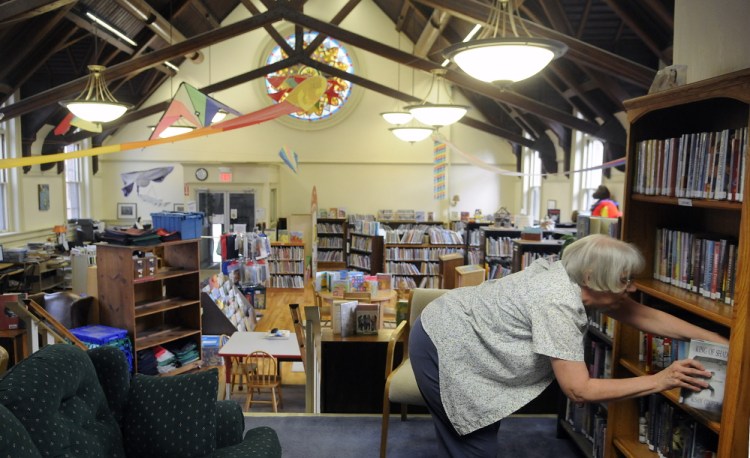When Gardiner elected officials decided to levy a 3 percent increase on what its neighboring communities pay to use the Gardiner Public Library, they said they wanted to see a long-term plan under which those communities might pay something closer to what Gardiner residents pay.
After studying the issues, an ad hoc committee came back with a number of recommendations, but no specific formula.
“We went out looking for a formula and had the assumption that other communities had worked this out,” committee member Steve Diamond said. “There is little to rely upon to see whether Gardiner should be doing something different.”
On a per capita basis, Gardiner residents pay about $50 to support the Gardiner Public Library. On the same basis, residents in Litchfield, Pittston, Randolph and West Gardiner pay a range of costs that are less than that — sometimes half or less. The member towns pay just under $100,000 a year to use the library.
That has raised questions both in Gardiner and in its neighboring towns about what a fair amount to pay is. At its Town Meeting earlier this year, Pittston residents spent an hour hotly debating the $23,292 Gardiner was seeking, and the measure passed only narrowly.
Gardiner’s ad hoc library committee delivered its report to the Gardiner City Council last month.
“We could have come up with a formula, and the task force said it was willing to work on that further,” Diamond said. “But we recommended an attempt at prior consultation with the towns.”
That leaves elected officials with a question of what to assess for library fees for the upcoming budget year. While Gardiner enacts its budget in June, Pittston and West Gardiner will consider their budgets at Town Meetings scheduled in March.
To be considered by budget committees, the fee schedule will have to be decided by the end of this year or very early next year, library Director Anne Davis said.
In its report, the committee offered these recommendations:
• Lift the moratorium on sales of individual cards to people who live outside Gardiner and its library partner towns.
• Create a policy that freezes sales to residents of towns that withdraw from the partnership.
• Set up discussions among elected officials from Gardiner and its partner towns before Town Meeting season starts.
• Consider alternate revenue streams, perhaps selling business cards to employers in Gardiner and partner towns.
• Stabilize charges for library services so they are not subject to annual and apparently arbitrary change.
• Establish a collaborative process for setting the contribution levels of the participating towns.
For the report, the committee surveyed libraries in the state. It found that 58 of the state’s libraries serve neighboring communities in addition to their own. Of that number, 19 are municipal libraries and 38 are private, non-profit entities.
The committee reviewed a sampling of six municipal libraries to understand whether those libraries have a formula to determine what fees they asses, and whether partner communities contribute what the host municipality does.
In the committee’s presentation to the Gardiner City Council in November, Diamond said five of the six had no real formula, or if they did, no one can remember what it was.
“Of the ones we sampled, Ellsworth is the only one that has a formula determining what the neighboring towns should pay,” Diamond said.
The Ellsworth library serves 18 neighboring towns and bases its assessment on circulation costs (one-third the salaries of the library workers who staff the front desk) multiplied by the percent of circulation represented by the neighboring towns.
Diamond said when the staff was asked why charges were assessed this way, it didn’t know. And as it turns out, he said, the partner towns are contributing 20 percent less than the formula dictates.
Two towns did not provide information and three towns did not have comparable fees.
The only library that assessed fees comparable to what its host community pays is the Prince Memorial Library in Cumberland. North Yarmouth is the only other town the Cumberland library serves, and it pays about the same as Cumberland does.
At the other end of the municipal range is the Abbott Memorial Library in Dexter. Dexter’s share amounts to $25 per capita while the share that neighboring towns pay is about $1 per capita.
Non-profit libraries were more likely to have a formula and charge fees to the neighboring towns that are comparable to what the host town pays.
Gardiner elected officials are expected to consider the fee schedule at a meeting later this month.
As a department of city government, the library was included in a comprehensive review of city services completed in 2015. As part of its analysis, Municipal Resources Inc. made several suggestions to make the library’s operation more efficient and suggested shifting its hours of operation and revising the cost formula that partner communities pay to use the library.
At the time, Davis said some of the recommendations would not save money and others were being considered.
The budget for the Gardiner Public Library is about 4 percent of the Gardiner municipal budget.
The Gardiner Library Association owns and maintains the building the library occupies and buys books for the library’s collection.
Jessica Lowell — 621-5632
Twitter: @JLowellKJ
Copy the Story LinkSend questions/comments to the editors.



Success. Please wait for the page to reload. If the page does not reload within 5 seconds, please refresh the page.
Enter your email and password to access comments.
Hi, to comment on stories you must . This profile is in addition to your subscription and website login.
Already have a commenting profile? .
Invalid username/password.
Please check your email to confirm and complete your registration.
Only subscribers are eligible to post comments. Please subscribe or login first for digital access. Here’s why.
Use the form below to reset your password. When you've submitted your account email, we will send an email with a reset code.